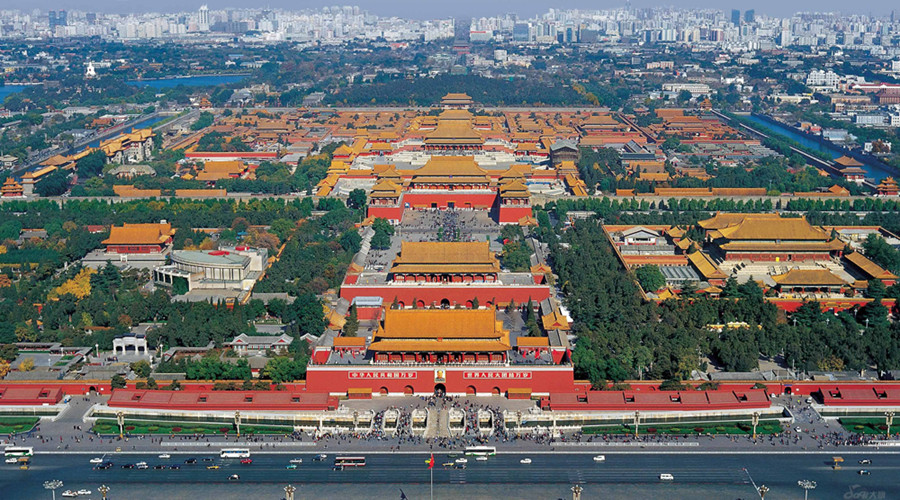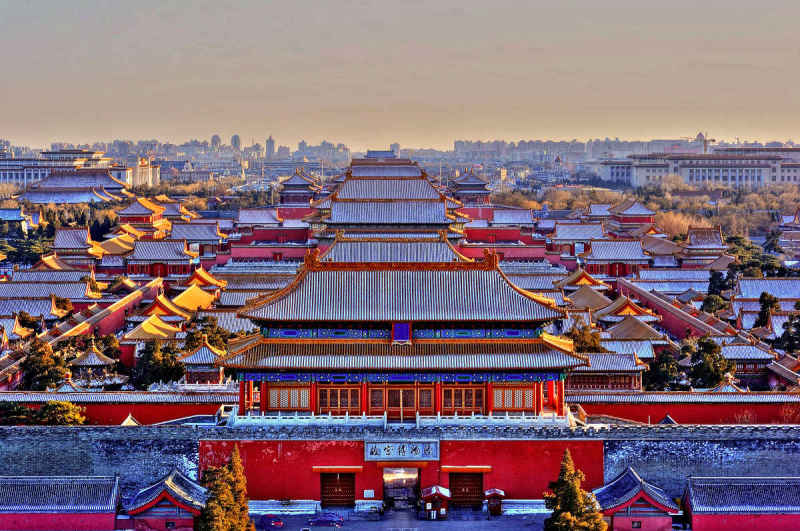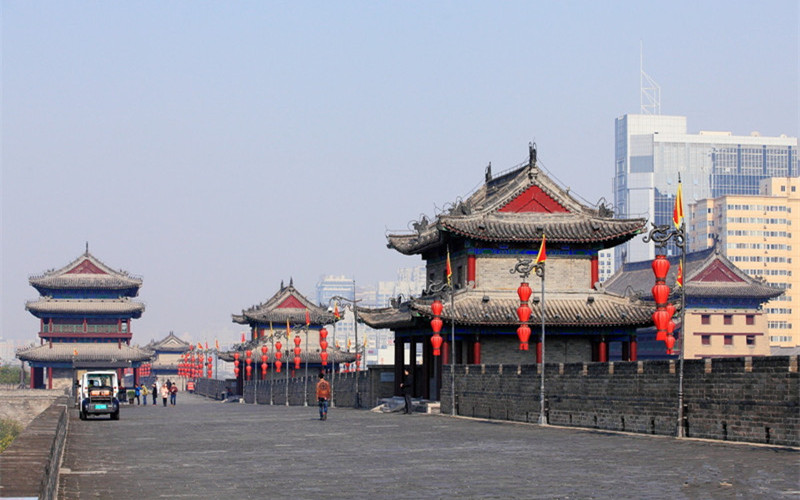
7 Days Beijing-Xian Muslim Tour
This tour will lead you to explore the unique charm of two ancient capitals in China. From the magnificent historical sites in Beijing to the profound cultural heritage in Xi’an, this seven – day journey is bound to be an unforgettable cultural adventure. Considering your Muslim faith, halal food options are carefully arranged throughout the itinerary. This ensures that you can not only savor delicious cuisines but also fully immerse yourself in the local cultures.
Highlights of the Itinerary
In – depth Cultural Immersion
Step into two ancient capitals of China. Walk through the Forbidden City (故宫博物院) and the Great Wall (长城) in Beijing, and explore the Ancient City Wall (古城墙) and the Terracotta Army (兵马俑) in Xi’an. This allows you to deeply touch the pulse of China’s thousands – year – old history and feel the blend of history and modernity.
Exclusive Gastronomic Delights
Halal cuisine is arranged throughout the journey, covering Beijing – style snacks, northern – style halal dishes, and authentic Xi’an flavors. You can relish the diverse regional food cultures while enjoying the delicious food.
Special Activity Experiences
Take a rickshaw ride through the hutongs in Beijing to experience the charm of old – Beijing life. Rent a bike and cycle along the Ancient City Wall (古城墙) in Xi’an, enjoying the unique scenery where the ancient and the modern coexist. Watch the live – action performance of The Song of Everlasting Sorrow to immerse yourself in the romantic love legend of the Tang Dynasty.
Itinerary Arrangement
Day 1: Arrival in Beijing
- Morning: Upon arrival at Beijing Capital International Airport, our dedicated staff will greet you and escort you to the hotel for check – in. Take a short rest to refresh yourself.
- Noon: Head to a halal restaurant near Niujie. Here, you can taste special dishes like hand – pulled lamb and lamb offal soup, thus commencing an authentic culinary experience. Niujie is a well – known Hui ethnic community in Beijing, where the halal food is both original and highly distinctive.
- Afternoon: Visit Tiananmen Square (天安门广场), one of the largest city squares globally, covering an area of 440,000 square meters. The Monument to the People’s Heroes (人民英雄纪念碑)on the square was erected to commemorate the revolutionary martyrs in modern and contemporary Chinese history. On the front of the monument body, there are eight gilded characters inscribed by Chairman Mao Zedong, “Eternal Glory to the People’s Heroes”. On the back is the inscription drafted by Chairman Mao Zedong and inscribed by Premier Zhou Enlai, recording the great feats of the heroes who sacrificed their lives for national independence and people’s liberation from the Opium War in 1840 to the founding of New China in 1949. If the Chairman Mao Memorial Hall (毛主席纪念堂) is open, you can pay your respects to Chairman Mao’s remains and remember this great leader. Here, you can deeply sense the integration of China’s history and modern times.
- Evening:
Come to the artistic and cultural Nanluoguxiang(南锣鼓巷). There are many unique shops and delicious foods here. It is recommended to go to Hongyunxuan Restaurant to taste authentic halal cuisine, such as hand – grabbed mutton, sauteed mutton with scallions, etc., and let your taste buds enjoy the old – Beijing flavor to the fullest.

Day 2: Beijing – The Forbidden City and Hutongs
- Morning: Explore the Palace Museum (故宫博物院), formerly known as the Forbidden City (紫禁城). It served as the imperial palace during the Ming and Qing dynasties in China and is one of the largest and best – preserved ancient wooden – structure building complexes worldwide. The Forbidden City (紫禁城)houses over seventy palaces of different sizes and more than nine thousand rooms. The buildings are magnificent, with red walls, yellow tiles, and resplendent gold – colored decorations. Follow the central axis to visit the three main halls (三大殿) (the Hall of Supreme Harmony (太和殿), the Hall of Central Harmony (中和殿), and the Hall of Preserving Harmony (保和殿)) and the three rear palaces (后三宫) (the Palace of Heavenly Purity (乾清宫), the Hall of Union (交泰殿), and the Palace of Earthly Tranquility (坤宁宫)). Each palace is rich in historical and cultural connotations, showcasing the dignity and luxury of the ancient royal family. Accompanied by a professional guide, you can learn more about the history of the Ming and Qing dynasties, which will enable you to better appreciate the charm of this imperial palace.
- Noon: Have lunch at a halal restaurant near the Forbidden City (紫禁城), enjoying northern – style halal dishes such as scallion – fried lamb and halal – style Kung Pao Chicken. The scallion – fried lamb is made with fresh lamb and scallions, and it gives off a delicious aroma after stir – frying. The halal – style Kung Pao Chicken uses chicken instead of pork, retaining the sweet and spicy flavor of the traditional Kung Pao Chicken.
- Afternoon: Embark on a rickshaw tour of the Beijing hutongs. The hutongs are the lifeblood of old Beijing, bearing witness to the historical changes of the city. While shuttling through the hutongs, you can observe the ancient siheyuan (courtyard houses). A siheyuan generally consists of the main house, the east and west wing rooms, and the reverse house, with a spacious courtyard in the middle, reflecting the traditional Chinese concept of family living together and architectural aesthetics. You can also interact with local residents to experience the lifestyle of old Beijing.
- Evening: Head to Huguosi Snack (Halal Store) to taste various traditional snacks such as aiwowo (a glutinous – rice – made snack filled with sesame, walnut, etc.) and lvdagunr (a snack made by wrapping sweet bean paste in glutinous rice balls and sprinkled with soybean flour). Aiwowo has a soft and sweet taste, and lvdagunr gets its name from the yellow dust raised when a wild donkey rolls on the outskirts of old Beijing. It is sweet, delicious, and has a unique flavor.

Day 3: Beijing – The Great Wall
- Morning: Proceed to Badaling Great Wall (八达岭长城), an important section of the Great Wall of China (中国长城)and a pass of the Ming Great Wall. Badaling Great Wall (八达岭长城) is located in a strategically crucial and perilous area, with overlapping mountains and a magnificent terrain. The city wall is tall and sturdy, and the watchtowers are densely distributed. You can choose to climb on foot to experience the grandeur and steepness of the Great Wall (长城) firsthand, or take a cable car to overlook the magnificent scenery of the Great Wall (长城) from the air. It winds like a giant dragon among the mountains, presenting a spectacular sight.
- Noon: Have a meal at a halal farmhouse near the Great Wall (长城), savoring rural – style halal food such as stir – fried leeks with free – range eggs (halal – style) and stewed lamb. The ingredients in the farmhouse are fresh, and the cooking method is simple, allowing you to taste the original rural cuisine.
- Afternoon: Continue to explore the Great Wall (长城)and enjoy the magnificent natural scenery. On the Great Wall (长城), you can overlook the rolling mountains, thick forests, breathe in the fresh air, and feel the charm of nature.
- Evening: Return to the urban area and have a special halal dinner at Youyihao (Halal Restaurant), such as halal – style Peking duck. The halal – style Peking duck here, with its unique roasting process and secret sauce, will offer you a unique and delicious experience.

Day 4: Beijing – The Summer Palace and the Bird’s Nest
- Morning: Visitthe Summer Palace (颐和园). It is a large – scale landscape garden built on the basis of Kunming Lake and Longevity Hill, modeled after the West Lake in Hangzhou and incorporating the design techniques of Jiangnan gardens. It is also the best – preserved imperial garden and was once a royal palace for temporary residence, renowned as the “Museum of Royal Gardens”. You can stroll along the Long Corridor (长廊), which is 728 meters long and adorned with more than 8,000 colorful paintings, featuring rich contents such as landscapes, flowers, birds, fish, insects, and figures. It is the longest painted corridor in the world. You can also climb Longevity Hill (万寿山)to overlook the beautiful scenery of the entire the Summer Palace (颐和园), admire the grandeur of the Tower of Buddhist Incense (佛香阁) and other buildings, or take a boat on Kunming Lake (昆明湖) to enjoy the tranquility and coolness of the lake.
- Noon: Have lunch at a halal restaurant near the Summer Palace (颐和园), tasting halal versions of Beijing home – cooked dishes such as halal – style Mapo Tofu and halal – style Di San Xian. The halal – style Mapo Tofu uses beef mince instead of pork mince, retaining the spicy and fragrant flavor. Di San Xian is mainly made of eggplant, potatoes, and green peppers. After frying and seasoning, it has a rich taste.
- Afternoon: Go to the Olympic Park to visit the Bird’s Nest (鸟巢)(National Stadium (国家体育场)) and the Water Cube (水立方) (National Aquatics Center (国家游泳中心)). The Bird’s Nest (鸟巢) is the main stadium of the 2008 Beijing Olympic Games. Its unique steel – structure appearance is like a “nest” that nurtures life and also like a cradle, embodying humanity’s hope for the future. It has advanced facilities inside and can accommodate a large number of spectators. Here, you can feel the charm of modern sports. The Water Cube (水立方), with the theme of “water”, has a blue membrane – structure exterior. Under the sunlight, it looks like a blue crystal, echoing the Bird’s Nest (鸟巢). It has advanced swimming facilities inside and has hosted many international competitions.
- Evening: Have dinner at a nearby halal restaurant and then return to the hotel to rest.

Day 5: Beijing – Xi’an – The Ancient City Wall
- Morning: Take a high – speed train to Xi’an. After arrival, check in at the hotel.
- Noon: Have lunch at a halal restaurant near the hotel, tasting Xi’an – style special dishes such as beef paomo (a traditional Xi’an dish with chewy bread, tender beef, and rich soup) and beef in broth. Beef paomo is a traditional food in Xi’an. When eating, you need to break the bread into small pieces and add beef, vermicelli, scallions, and other ingredients, and then pour on the hot soup, which gives off a delicious aroma. Beef in broth is mainly made of beef and vermicelli, with a delicious and nutritious soup.
- Afternoon: Climb the Xi’an Ancient City Wall (西安古城墙), one of the largest and most completely preserved ancient city walls in China. The Xi’an Ancient City Wall (西安古城墙)is 13.7 kilometers long and has four gates, namely Changle Gate (长乐门), Yongning Gate (永宁门), Anding Gate (安定门), and Anyuan Gate (安远门). You can rent a bicycle and ride around the city wall (城墙). During the ride, you can enjoy the scenery inside and outside the ancient city and feel the historical charm of Xi’an. The buildings around the city wall (城墙) have a simple and ancient style, and in the distance are modern high – rise buildings. The combination of the ancient and the modern is unique.
- Evening: Indulge in various halal snacks in Huimin Street, a gathering place for Muslim cuisine. You can taste snacks such as lamb kebabs, baked nang (a kind of bread), and zenggao (a steamed snack made of glutinous rice, red dates or candied dates). The lamb kebabs are made of fresh lamb, grilled over charcoal fire and sprinkled with cumin and chili powder. They are fragrant, crispy on the outside, and tender on the inside. The baked nang is a common pasta in Xinjiang and Xi’an, made of flour and sprinkled with sesame seeds on the surface. It has a crispy texture and a strong wheat flavor. Zenggao is steamed with glutinous rice, red dates or candied dates, with a bright color, soft and sticky texture, sweet but not greasy.

Day 6: Xi’an – Terracotta Army and Huaqing Palace
- Morning: Go tothe Emperor Qinshihuang’s Terracotta Army Museum (秦始皇兵马俑博物馆), the largest site – based museum in China, known as the “Eighth Wonder of the World”. The Terracotta Army (兵马俑)is a burial pit of Emperor Qinshihuang’s Mausoleum, with a large number of terracotta warriors, horses, and chariots buried inside. They are vivid, with different shapes and a huge lineup, vividly showing the military power of the Qin Dynasty. There are various types of terracotta warriors, such as general terracotta warriors (将军俑), warrior terracotta warriors (武士俑), chariot – soldier terracotta warriors (车兵俑), and cavalry terracotta warriors (骑兵俑). Each terracotta warrior has a unique facial expression, hairstyle, and clothing, reflecting the superb sculpture skills and artistic level of the Qin Dynasty. Follow a guide to learn about the history of the Qin Dynasty, which will help you better understand the stories behind these terracotta warriors.
- Noon: Have lunch at a halal restaurant near the Terracotta Army (兵马俑), tasting Shaanxi – style halal food such as lamb saozi noodles and halal – style sesame – paste cold noodles. The lamb saozi noodles have long and thin noodles, delicious saozi (minced meat topping), red oil on the surface, a sour and spicy soup, and a chewy and refreshing taste. The halal – style sesame – paste cold noodles are mainly made of cold noodles, paired with sesame paste, chili oil, cucumber shreds, and other seasonings. They have a smooth taste and a rich flavor.
- Afternoon: Visit Huaqing Palace (华清宫), an ancient imperial hot spring bath in China and a historical royal garden. Relying on the hot spring resources, there are ruins such as the “Crabapple Soup (海棠汤)”and “Lotus Soup (莲花汤)” where Emperor Xuanzong of the Tang Dynasty and Yang Guifei bathed. The buildings have a simple and elegant style, full of historical charm. The famous “Xi’an Incident” also took place here. Buildings such as the Five – Room Hall (五间厅) witnessed this important historical event. You can learn about that eventful history here.
- Evening: Watch the live performance of The Song of Everlasting Sorrow. The performance is set against the landscape of Huaqing Palace (华清宫). Through various art forms such as lighting, music, and dance, it vividly shows the love story between Emperor Xuanzong of the Tang Dynasty and Yang Guifei, making you feel as if you have traveled back to the Tang Dynasty and experienced that romantic and tragic love legend. After the performance, have dinner at a nearby halal restaurant.

Day 7: Xi’an – Giant Wild Goose Pagoda and Departure
- Morning: Visitthe Giant Wild Goose Pagoda (大雁塔), the earliest and largest existing square – shaped brick pagoda of the Tang Dynasty. It was built to preserve the sutras and Buddha statues brought back to Chang’an by Monk Xuanzang from India via the Silk Road. The Giant Wild Goose Pagoda (大雁塔)is 64.517 meters high, with a simple and grand shape. Climb to the top of the pagoda (塔), and you can overlook the beautiful scenery of Xi’an city, feeling the prosperity and tranquility of this city. There are also many precious cultural relics and Buddhist scriptures preserved in the pagoda (塔), which is an important symbol of Buddhist culture.
- Noon: Have lunch at a halal restaurant near the Giant Wild Goose Pagoda (大雁塔), tasting Shaanxi cuisine such as halal – style Huluji (made of chicken in halal – style) and beef in broth. The halal – style Huluji has a golden and crispy outer skin and tender and juicy chicken inside. Beef in broth is a traditional Shaanxi dish with a delicious soup.
- Afternoon: Have free time for activities or shopping. You can buy some souvenirs with Xi’an characteristics in nearby stores, such as terracotta warrior replicas, paper – cuts, and shadow puppets. Then, you will be taken to the airport to conclude this pleasant journey.

Transportation and Accommodation
Transportation
Within Beijing and Xi’an, you can choose the subway, taxi, or chartered car for transportation. The journey from Beijing to Xi’an is by high – speed train, which is convenient and fast.
Accommodation
In both Beijing and Xi’an, four – star hotels in the city center are selected. They are convenient for transportation, fully equipped, and there are numerous halal restaurants nearby for your choice.
Service Included:
- Admission fees for all of the sightseeing spots listed in the itinerary;
- Meals as listed in the itinerary;
- Hotels as listed in the itinerary;
- Private English-speaking tour guide;
- Private vehicle for transfers & sightseeing with skilled driver;
- Service charge & government taxes;
- Luggage transfers between airports and hotels;
- Domestic train tickets of soft sleeper.
Service Excluded:
- Any arrival and departure international airfares or train tickets;
- Chinese visa fees;
- Excess baggage charged by Airlines;
- Single room supplement;
- Tips to guides and drivers;
- Personal expenses and gratuities to service staff;
- Personal travel accident insurance;
- All optional programs.














